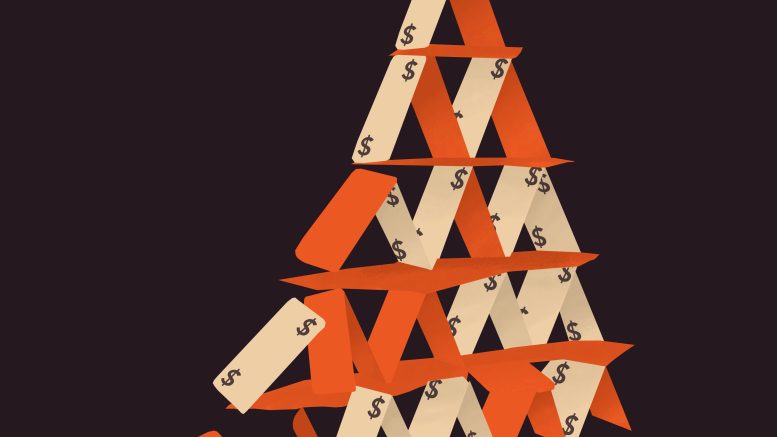Manitoba’s Progressive Conservatives closed out the better part of a decade of austerity consistently, if nothing else. The Manitoba government has reportedly sold off more social housing to the private sector than it funded over the past seven years.
This, after the Right to Housing coalition called on the province to supply 1,000 rent-geared-to-income housing units annually for 10 years, on top of maintaining existing stock. Although the province funded 287 projects, it sold off 374, leaving Manitoba’s social housing stock at a deficit of 87 since 2016.
The news hits harder as the so-called “housing crisis” looms over most young people’s futures in Canada. Housing in Toronto is ranked among the most overvalued housing markets in the world, surpassing cities like New York, Los Angeles and Paris.
Won’t the private sector simply fill in the vacuum left by social housing, offering cheap rental units to meet demand?
Unfortunately, no. As much as people love to gesture to a god-like figure of “the market” that keeps society well-oiled and running, the market will only make this problem worse. Writer Karl Beitel argues that not only will the market never supply housing affordable to most people who need it in urban centres, efforts to make housing cheaper — like densification and increasing supply — will not reduce prices “within the current capitalist context.”
What is being called a housing crisis is a crisis of capitalism. The public’s allergy to addressing the issue directly is permitting governments’ limpidly passive approaches to alleviating a disaster.
Well-intentioned critics of the housing crisis argue it’s a result of insufficient stock. Increased demand supposedly leads to shorter supply, and therefore prices increase when supply is scarcer. Offering more supply to meet demand theoretically ought to ease the currently burdensome cost of housing.
Economic truisms like supply and demand overlook vast swaths of reality. For one thing, land is a finite resource. Increasing the supply of land in downtown Toronto is impossible. We can only densify cities, building upwards and using the same land to house more people.
But even increasing supply through densification is not the cost-reducing measure it seems. In cities that are already much more densely populated, the cost of building increases because hurdles like demolishing pre-existing structures protract development periods.
The longer a project takes, the more costly it becomes. This means it takes longer to recoup development costs and then turn a profit. In short, the market encourages developers to create luxury units that are out of reach for most people living in cities, because units with higher prices are quicker to yield a profit and justify investment.
In contrast, social housing does not need to turn a profit. There is no market pressure to do more than recoup costs on social housing.
Never mind the possibility that the supply already exists and is just managed improperly. CBC reported that while over 5,000 people are on the waitlist for Manitoba Housing units, nearly 2,000 units are currently sitting vacant in the province. Many of the units are in states of extreme disrepair, a sign of poor stewardship on the province’s part.
Even luxury units are often vacant in urban centres. Beitel points out that many luxury rental units are kept that way purely for the comfort of rich people who may use them when they come into town.
Another huge question mark over housing supply is what effect short-term rental services like Airbnb have on the market. The company claims that listings on Airbnb account for less than one per cent of the market share in Canada, but that is not an insignificant amount when so many Canadians are squeezed.
Researchers from McGill found that in 2018 alone, over 31,000 units in Canada were likely taken off the rental market because they were used so often as Airbnbs. McGill researchers also found that in June of 2023, over 86 per cent of the short-term rental listings on the service were entire homes. In June 2023, researchers estimate there was a 19 per cent increase in rents in B.C. from 2022 because of the impact of short-term rentals.
While there is not enough data on Airbnb specifically, it undoubtedly is part of the problem.
University of Manitoba professor of economics Fletcher Baragar and University of Ottawa professor Mario Seccareccia explained in a 2008 paper that the home is the primary form of capital for many people. On top of that, there is a cultural expectation that housing will always — eternally — be a sound investment.
Beneath headlines about young people being priced out of home ownership, there is a deeper anxiety that without home ownership we will lose our best investment option and therefore prospects for social mobility or security. The Canada Pension Plan (CPP) does not promise a livable income in retirement. In fact, CPP payments are on average around $770 monthly. Without a house, what are we to do in our old age?
Disappearing homeownership opportunities wouldn’t be so bad if the rental ecosystem wasn’t atrocious. My rent will be increasing by almost 6 per cent next year. The increase tacks on more than an extra month’s rent to the annual amount the unit costs to lease. The company that owns my building justifies this increase because new flooring was installed in my building, and they divided the cost across all units.
New flooring wasn’t installed in my unit, though. The building has also had pharaoh ants since before I moved in, and the company does the bare minimum to deal with them.
As of Jan. 1, 2024, Manitoba’s rent increase limits will rest at 3 per cent, with any increases beyond that needing approval from the provincial government. Most above-guideline increase requests are approved too. The price of rental two-bedroom units increased by over 11 per cent in 2022 and 2023 in Winnipeg.
Arguably, these increases ensure landlords can do necessary reparative work. But the thing is that repairs always add to the landlord’s capital, meanwhile stained carpeting, permanent pest problems and banged up cabinetry never depreciate even if they ought to.
This is the problem: the line cannot always go up. Housing as it is valued should not project growth into eternity because that is impossible and bad.
It is imperative that we understand exactly to what extent the market is exacerbating the housing crisis as well as how a lackadaisical government allows the problem to run wild. If we don’t, people start filling in the gaps with very troubling myths and hearsay. In particular, many Canadians have been convinced that Chinese investors have inflated the price of housing.
This is a Sinophobic myth that I suspect is derived from white people simply noticing people of East Asian descent more often. One report stated definitively this is a myth, which makes the feds’ decision to ban foreign investors for two years look ineffectual at best.
We have to stop averting our gaze from the real problem. What we call the housing crisis is a natural consequence of capitalism. Maintaining wealth inequality, where some people can afford lots of property and some people can’t, is extremely expensive for most of society.
The market will not save us. We need radical solutions to remedy a radically awful problem. One of those solutions is for the government to buy out the private sector and put those units out at a price that’s affordable to most people. This might require a combination of hefty vacancy taxes to outright expropriating properties hoarded by investment firms.
People need to start taking action. Tenants in Toronto are going on rent strikes in increasing numbers to protest colossal rent hikes. Ultimately, we have to de-financialize housing and demand our governments provide secure housing for all immediately.





